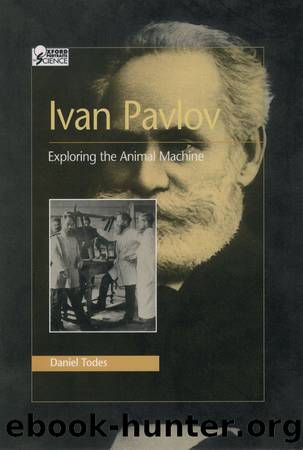Ivan Pavlov by Daniel Todes;

Author:Daniel Todes; [Todes, Daniel]
Language: eng
Format: epub
ISBN: 9780195105148
Publisher: Oxford University Press USA
Published: 2015-02-24T14:04:59+00:00
The digestive machine was especially complicated because it was inhabited by a sort of âghostâ; namely, the animalâs psycheâits personality and changing moods, and its food preferences. Remember that earlier, Pavlov and Ekaterina Shumova-Simonovskaia had proved the important role of appetite in making gastric juice flow. If a dog enjoyed eating food, the gastric glands in the stomach began to produce juice even if the food never actually reached the stomach. âAppetite,â Pavlov wrote, âis the first and mightiest exciterâ of gastric juice in the stomach.
One of Pavlovâs first experiments in his new laboratory showed that if an animal was hungry enough, this gastric juice flowed even if the animal merely saw a piece of food. (Some scientists had actually noticed this years before, but they could not make it occur regularly in a laboratoryâand so could not convince their colleagues that this was a normal part of digestion.)
This ghost did not act the same way every time. Pavlov noticed that, just like people, different dogs like different foods, and that a dogâs food preferences change from day to day and moment to moment. Also like people, dogs have different personalities. Some dogs were âgreedierâ for food than others, and so they produced more appetite juice. Some dogs were âdreamierâ than others: these dogs would be more likely to get their gastric juices flowing just by seeing food. Other dogs were more âcold-bloodedâ: Their gastric glands did not start working until the food was actually in their mouths. Some dogs were âcunningâ and easily insulted: If the experimenter showed some food to such a dog without actually feeding it, the dog might think it was being teased and react much as a hungry person would in that situation; that is, it would get angry and turn away from the experimenter rather than producing gastric juice in eager anticipation of a meal.
For these reasons, the personality and mood of a dog added an unpredictable element to the digestive machine. In characterizing his dogsâ mood and personality, Pavlov was influenced both by the patterns of gastric flow and by subjective interpretations of the dogsâ behavior. The main point is that these experiments did not turn out exactly the same each time. For precisely this reasonâthat the dogsâ psyche did not behave predictablyâPavlov did not think it was a simple reflex.
Another important fact was this: Without âappetite juice,â most foods did not get digested. They just remained in the stomach until they rotted. The ghost in the digestive machineâappetite and personalityâclearly played a very important role in its function.
Pavlov thought that his experiments explained why some people had problems digesting their food. Too often people ate hurriedly, without paying attention to their food, or they were worried and preoccupied at meals. For this reason, they did not produce the necessary âappetite juiceâ to digest their food. Although people had not understood this scientifically, they had developed habits and customs to increase their appetite. For example, there was a good scientific basis for having
Download
This site does not store any files on its server. We only index and link to content provided by other sites. Please contact the content providers to delete copyright contents if any and email us, we'll remove relevant links or contents immediately.
| Administration & Medicine Economics | Allied Health Professions |
| Basic Sciences | Dentistry |
| History | Medical Informatics |
| Medicine | Nursing |
| Pharmacology | Psychology |
| Research | Veterinary Medicine |
The Salt Fix by Dr. James DiNicolantonio(1929)
Rebecca Skloot by The Immortal Life of Henrietta Lacks(1909)
Stiff - The Curious Lives of Human Cadavers by Mary Roach(1766)
Rigor Mortis by Richard Harris(1613)
The Telomerase Revolution by Michael Fossel(1577)
Undue Risk by Moreno Jonathan D.;(1541)
Extremes: Life, Death and the Limits of the Human Body by Fong Kevin(1444)
07 by H. M. Ward(1350)
02 by H. M. Ward(1344)
Kathryn Bowers & Barbara Natterson-Horowitz by Zoobiquity(1344)
01 by H. M. Ward(1327)
Essentials of Biostatistics in Public Health by Sullivan & Sullivan(1321)
06 by H. M. Ward(1307)
Why We Snap: Understanding the Rage Circuit in Your Brain by Douglas Fields(1274)
03 by H. M. Ward(1249)
05 by H. M. Ward(1248)
04 by H. M. Ward(1232)
A Life Everlasting by Sarah Gray(1194)
Critical Thinking: Understanding and Evaluating Dental Research by Donald Maxwell Brunette(1190)
